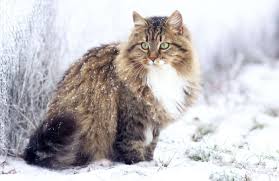
Siberian
Conditions of detention
Siberians are adaptable cats that thrive in various living environments, from apartments to larger homes. They enjoy having space to explore and play and benefit from interactive toys and companionship with their human families.
Useful Fact:
Siberians are known for their playful and affectionate nature, making them excellent companions for families. They are also noted for their hypoallergenic qualities, as they produce lower levels of the protein Fel d 1, which is responsible for many cat allergies.
Nutrition and diet
Siberians require a balanced diet rich in high-quality protein to support their muscular build and maintain their thick coat. Both wet and dry food should be provided to ensure hydration and dental health. Monitoring their food intake is important to prevent obesity.
Useful Fact: Including omega-3 and omega-6 fatty acids in their diet helps maintain their coat’s health and shine.
Health
Siberians are generally healthy cats with few breed-specific genetic issues. Regular veterinary check-ups are essential to monitor their overall health and catch any potential problems early. Vaccinations and preventive care are also important.
Useful Fact: Siberians are known for their strong immune systems and resilience to various health conditions.
Grooming and care
Their thick, water-resistant triple coat requires regular grooming to prevent matting and reduce shedding. Weekly brushing is typically sufficient, but more frequent grooming may be needed during shedding seasons. Regular nail trimming, ear cleaning, and dental care are also important.
Useful Fact: Despite their dense fur, Siberians are relatively low-maintenance compared to other long-haired breeds due to the texture of their coat.
Education and training
Siberians are intelligent and can be trained to follow basic commands and use a litter box efficiently. Positive reinforcement techniques, such as treats and praise, are effective in training this breed.
Useful Fact: Their intelligence and playful nature make Siberians quick learners who enjoy interactive toys and puzzle feeders.
Toys and entertainment
These active and playful cats enjoy a variety of toys, including feather wands, interactive toys, and puzzle feeders. Providing climbing structures and high perches can help satisfy their natural instincts and keep them entertained.
Useful Fact: Siberians are natural athletes and enjoy activities that challenge their agility and intelligence.
Safety
Siberians should be kept indoors or in a secure outdoor enclosure to protect them from potential dangers such as traffic, predators, and diseases. Microchipping and providing identification tags are essential for their safety.
Useful Fact: Their adventurous spirit makes it important to ensure a safe and secure environment to prevent them from wandering off.
Accessories
Essential accessories for Siberians include a comfortable bed, high-quality scratching posts, a variety of toys, and a sturdy cat carrier for travel. Regular grooming tools like brushes and combs are also important.
Useful Fact: Investing in a high-quality scratching post can help satisfy their natural scratching instincts and protect your furniture.
Socialization
Siberians are sociable and thrive on human interaction. They get along well with children and other pets, making them excellent family companions. Early socialization helps them become well-adjusted and confident adults.
Useful Fact: Their affectionate nature often leads them to seek out attention and companionship from their owners.
Travel and Transportation
When traveling, use a secure and comfortable cat carrier. Familiarizing your Siberian with the carrier before trips can reduce stress. Ensure they have access to water and take breaks during long journeys.
Useful Fact: Bringing familiar items like a favorite blanket or toy can help reduce anxiety during travel.
Behavior and psychology
Siberians are known for their friendly, playful, and affectionate nature. They enjoy interactive play and form strong bonds with their families. Their gentle demeanor makes them excellent pets for quiet households and families.
Useful Fact: Siberians often exhibit dog-like behavior, following their owners around and engaging in playful activities.
Legal aspects
Ensure your Siberian is up-to-date on vaccinations and registered according to local regulations. Spaying or neutering is recommended to prevent unwanted litters and reduce certain health risks.
Useful Fact: Many regions require cats to be microchipped and wear identification tags, which can help in reuniting lost pets with their owners.


